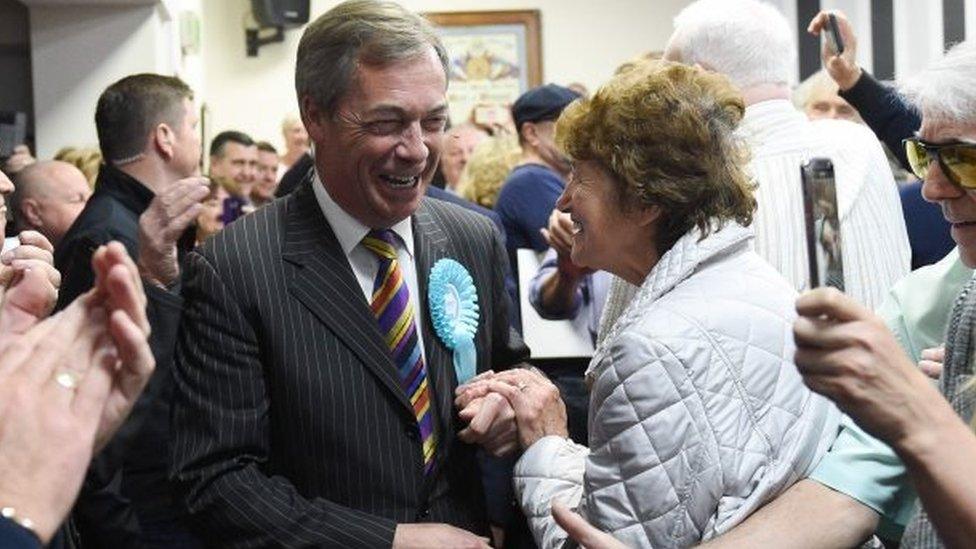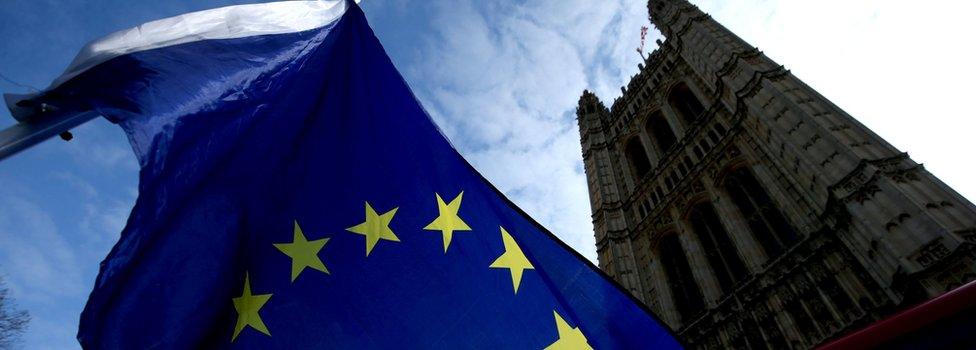Brexit Party: Farage says Labour 'vulnerable' in Leave area
- Published
- comments

Brexit Party leader Nigel Farage says the Labour Party is "vulnerable in the most extraordinary way" in Leave-voting areas in the north of England.
Mr Farage was speaking at a rally in Pontefract, West Yorkshire - part of Labour MP Yvette Cooper's constituency - ahead of the European elections.
"The passion seems even stronger in Labour Leave areas than in Conservative Leave areas," he told the audience.
But Ms Cooper said Mr Farage's no-deal Brexit stance was a threat to jobs.
Elections for 73 MEPs to the European Parliament will take place on 23 May.
Mr Farage told the rally there was "real anger" in the places like Pontefract.
"This is a 70% Leave constituency, these five towns voted Leave by a massive margin," he said.
"You've got a member of Parliament who, at the general election a year later, promised to honour the result, and has spent the last two years, effectively, trying to stop Brexit from happening."
Allow X content?
This article contains content provided by X. We ask for your permission before anything is loaded, as they may be using cookies and other technologies. You may want to read X’s cookie policy, external and privacy policy, external before accepting. To view this content choose ‘accept and continue’.

Mr Farage, who was UKIP leader during the 2016 EU referendum, told the rally that the European election campaign was the "biggest and most important campaign that I've ever fought".
"Not only can we win this, we can transform the political landscape of this country."
He said the party would "put up a full slate of policies" after the elections - including the scrapping of the HS2 rail project - but would not have a manifesto going into the vote itself.
The UK had been due to leave the EU on 29 March, but the deadline was pushed back to 31 October after Parliament was unable to agree a way forward.
The government and Labour are currently to try to find a way out of the impasse.
'Nasty nationalism'
Writing in the Guardian on Monday, shadow Brexit secretary Sir Keir Starmer said a cross-party Brexit deal would not get through Parliament unless it was put to a fresh public vote.
But Mr Farage said holding one would be an "outrage".
"You've got most Labour MPs backing this confirmatory referendum, which wouldn't even give us the choice of actually leaving properly.
"I think the Labour Party could be in more trouble over this."
Labour's deputy leader Tom Watson will say later that there are "only two forces that can win" in the European elections, "that nasty nationalism of the Farage Brexit Party, or the tolerant, compassionate outward-looking patriotism of the Labour Party".
"I can only plead with Labour supporters - don't stay at home, don't put that cross elsewhere, don't let them win."

At the scene: Alex Forsyth, BBC political correspondent
The open-topped Brexit Party bus rolled into Pontefract town centre this morning with a smiling Nigel Farage on board.
Within a few minutes, he was being stopped by passers-by wanting to shake his hand and pose for a selfie. Most brought up Brexit unprompted, expressing frustration or anger at the current situation; a sentiment which Mr Farage - in his element meeting people face-to-face - echoed.
The vast majority of people seemed pleased to see him, but there were jeers too - one shouted "liar" as the entourage passed. Another former Labour voter stopped to question him about his wider policy platform - what his party stands for beyond Brexit.
From Pontefract it was on to a working men's club in Featherstone; a pre-advertised event which saw the room packed full.
A series of Brexit Party candidates - including the former Tory Ann Widdecombe - were greeted with cheers as they took to the stage. When Nigel Farage, the last to speak, stood up it was to a rapturous reception - albeit one that might be expected from a cohort of declared Brexit supporters.

Ms Cooper urged "all political parties to come together" to counter The Brexit Party message.
"It won't be Nigel Farage and right-wing hardliners who suffer if manufacturing jobs are lost and food prices go up as a result of the divisive no-deal chaos they want," she said.
"It will be hard-working families in manufacturing towns like ours."
Former Conservative MEP Daniel Hannan said there was an alternative Brexit to the one being argued for by Mr Farage, but it would take a different prime minister to secure it.
"There must be space for people who want Brexit to happen in a liberal, agreed, orderly and grown-up way," he told BBC Politics Live.
"Not every Leaver is for the hardest kind of aggressive future relationship with the EU. Most of the people who voted Leave want us to have good and cordial relations with our European neighbours."

Who is standing in the European elections?

The UK is divided into 12 regions, each represented by between three and 10 MEPs depending on population size.
Seats in England, Scotland and Wales are awarded to parties according to their share of the vote, to candidates on lists drawn up by the parties.
Northern Ireland elects MEPs using a single transferable vote system, with voters able to rank candidates in order of preference.
